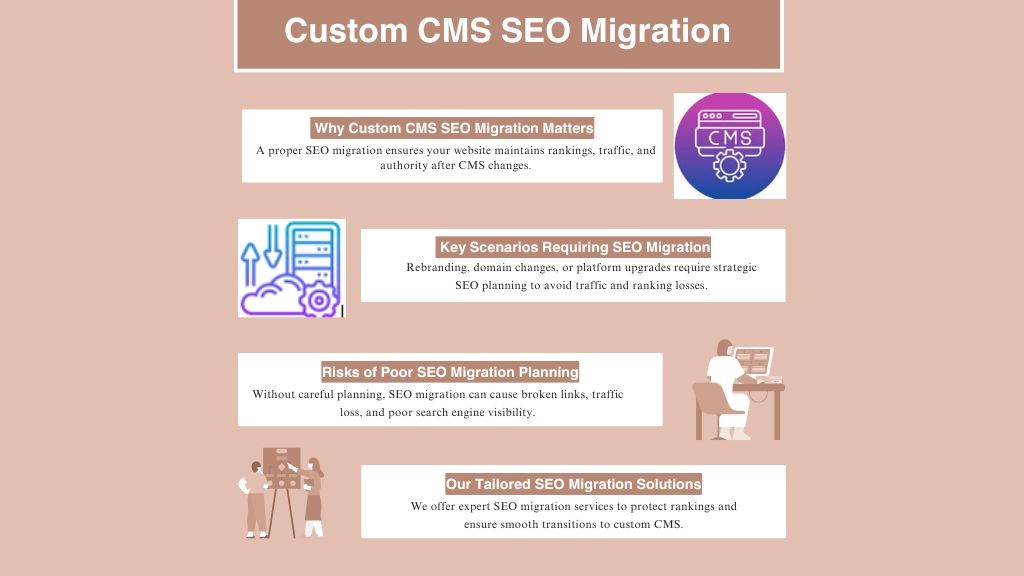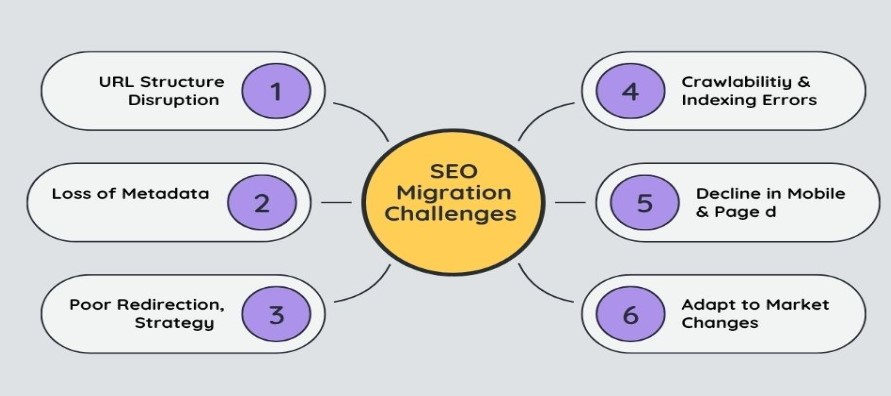Migrating to a custom CMS is a powerful move for businesses planning a complete website overhaul. But without a well-thought-out SEO migration strategy, your traffic and rankings can drop overnight. Whether you’re rebranding, changing your domain, or simply upgrading your platform, understanding how custom CMS SEO migration works is essential.
We provide tailored solutions that safeguard your SEO equity during migrations. This guide walks you through everything you need to know about planning and executing a successful custom CMS SEO migration strategy.

Why SEO Migration Matters in a Website Overhaul
Upgrading your website might feel exciting, but if SEO isn’t handled correctly, it can cause serious problems:
- Loss of keyword rankings
- Sudden drop in organic traffic
- Broken links and 404 errors
- De-indexing of important pages
- Disruption of search engine crawlability
Custom CMS platforms give businesses greater flexibility and control. However, transitioning without a structured SEO plan can undo years of effort. That’s why proper SEO migration must be a key part of your website overhaul.
What Is Custom CMS SEO Migration?
Custom CMS SEO migration refers to the process of preserving and transferring all your website’s SEO value, such as keywords, metadata, internal links, backlinks, and indexed pages, while moving to a new custom content management system. It goes beyond just moving files or updating the site design.
A strong SEO migration ensures:
- Your new site is search engine friendly
- All important pages are redirected correctly
- URL structures are optimized
- Site speed and mobile performance improve
- You retain your search engine visibility
Challenges Faced During SEO Migration
Understanding the potential obstacles is crucial before beginning your SEO migration journey.
1. URL Structure Disruption
When switching CMS platforms, the default URL format often changes. Even small variations in URLs can lead to broken links and lost SEO value. That’s why setting up accurate 301 redirects is critical during a custom CMS SEO migration.
2. Loss of Metadata and On-Page Elements
Meta titles, descriptions, headers, and alt text must be preserved across every page. If these elements get lost, search engines may struggle to understand your new site, hurting your visibility.
3. Poor Redirection Strategy
Improper or missing redirects cause 404 errors, damage your site authority, and negatively impact user experience. Every old URL must be mapped to a corresponding new page.
4. Crawlability and Indexing Errors
Search engines rely on well-structured sitemaps and robots.txt files to crawl and index websites. A new CMS may have different ways of managing these files, requiring careful updates during migration.
5. Decline in Mobile and Page Speed Performance
Custom CMS platforms offer flexibility, but can sometimes slow down a website if not optimized correctly. Slow-loading or non-mobile-friendly websites are penalized by search engines, so speed optimization must be part of the SEO migration.
Key Steps for Successful Custom CMS SEO Migration
Here’s our step-by-step approach to ensure your SEO migration is smooth and effective.
1. Pre-Migration SEO Audit
We start by auditing your current website:
- Identify top-performing pages and keywords
- Review current backlinks
- Collect metadata for all pages
- Map the existing URL structure
This helps us build a migration roadmap that retains your website’s SEO authority.
2. Content Preservation and Enhancement
During the migration, we ensure your content doesn’t just survive—it thrives. All existing content is preserved, reviewed for quality, and enhanced with updated keywords, formatting, and multimedia.
3. URL Mapping and 301 Redirect Planning
Every old URL is mapped to its new version, and permanent 301 redirects are implemented to guide search engines and users seamlessly. This prevents loss of traffic and maintains SEO strength.
4. Metadata Transfer and Optimization
All meta titles, descriptions, image alt tags, and headers are transferred and optimized using the latest SEO best practices. We avoid duplication and ensure that every page is correctly indexed.
5. Sitemap and Robots.txt Configuration
We generate new XML sitemaps compatible with your custom CMS and update robots.txt files to guide search engine crawlers. These are then submitted to Google Search Console and Bing Webmaster Tools.
6. Mobile and Speed Optimization
Post-migration, we optimize your new website for mobile users and fast performance. This includes compressing files, leveraging browser caching, and removing unnecessary scripts.
Post-Migration Checklist and Monitoring
A successful migration doesn’t end after launch. We continuously monitor your site post-migration to catch and fix issues early.
1. Performance Tracking
We use analytics tools to track traffic, rankings, bounce rate, and conversion metrics, ensuring everything remains stable or improves after the migration.
2. Crawl Error Resolution
Regular crawl reports from Google Search Console help us spot any redirect issues, broken links, or indexing problems.
3. Link Equity Recovery
We analyze and recover lost backlinks by reaching out to referring domains and updating them with the new URLs.
Benefits of Custom CMS SEO Migration
Long-Term SEO Control
Custom CMS platforms provide full control over every SEO component—from URL slugs to custom scripts. This helps future-proof your SEO strategy.
Improved Site Architecture
Migrating allows you to reorganize your site structure for better navigation, UX, and crawlability. A clear hierarchy helps search engines and users alike.
Scalability and Flexibility
A custom CMS is scalable, allowing you to add new features, pages, and campaigns without depending on third-party plugins.
Enhanced Brand Image
A fresh, well-optimized website reflects professionalism and builds trust with visitors. That translates to higher engagement and conversions.
Why Choose Experts for SEO Migration?
While it may sound simple, SEO migration is highly technical and time-sensitive. Small errors can have massive consequences.
Experience with Complex CMS Platforms
We have years of experience handling complex migrations from platforms like WordPress, Joomla, Magento, and custom-built systems to advanced custom CMS setups.
Data-Driven SEO Execution
Our approach is based on detailed audits, keyword data, technical analysis, and live testing to prevent any loss of SEO rankings.
Complete Migration Support
We handle everything from planning, redirect mapping, and sitemap setup to post-migration monitoring, so you don’t miss a single detail.
One-Stop SEO Strategy Partner
From content migration to speed optimization and link recovery, our service covers it all. You get a high-performing website backed by strong SEO results.
Trust Kinfotech for Your Custom CMS SEO Migration
If you’re planning a website overhaul, don’t risk your hard-earned SEO progress. Kinfotech offers tailored SEO migration services that ensure a seamless transition to your new custom CMS without losing rankings or traffic.
Our team understands the unique challenges involved and crafts strategies that suit your business goals, technical requirements, and SEO needs. Let us help you retain your online presence and drive growth.

FAQs
Temporary fluctuations are common, but with proper planning, your rankings should recover quickly and often improve.
Yes, all your content can be safely preserved and even improved during the migration process.
Yes. We update Google Search Console with new sitemaps and monitor crawling to ensure the new version is indexed correctly.
It can be. With full control over URLs, meta tags, and page structure, custom CMS platforms often outperform closed systems when optimized correctly.
The Bottom Line
A custom CMS SEO migration is not just a technical switch, it’s an opportunity to upgrade your entire online performance. By following a structured approach, monitoring results, and optimizing every step, you can ensure your new site ranks higher and performs better. Plan smart, migrate strategically, and let your business grow without disruption.


